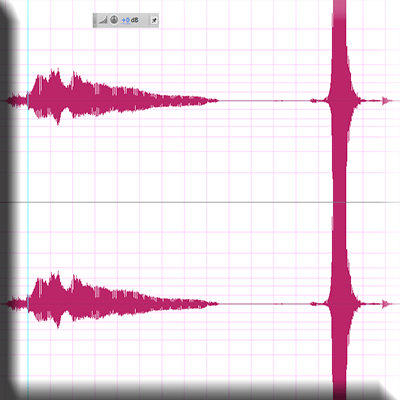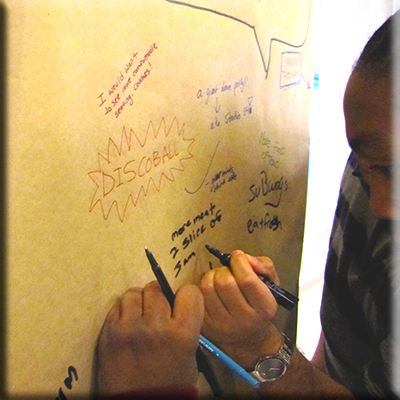Words on flagging banners are cut out, with letters left hanging; phrases like “Long Time No Ocean” become difficult to read. Language here functions in dual ways as both a communicative tool and an evocative form. In the absence, concealment, or constant rebuilding, a space opens up for a shift of meaning and it is this moment of shift that I am particularly interested in.
Special Sections
Special sections published within or across issues.
Make(r) Space, Making Space: A Media Ecology in Two Parts
The pop-up maker space hosted by the Media Interventions working group of the Cultural Studies Association at the 2014 annual meeting, ‘Ecologies: Relations of Culture, Matter, and Power,’ is a collaborative intervention into the typical structure of academic conferences in the interdisciplinary humanities and social sciences, whose genres and formats tend to privilege established scholars, disciplinary paradigms, the new, and above all a mindset in which the resources attached to ‘professionalization’ are governed by scarcity. Held concurrently with the main conference schedule at the University of Utah’s historic Pierre Lassonde House, the maker space showcases the work of artists, activists, media practitioners, performers, researchers, and amateur ‘makers,’ inviting conference attendees to engage the material not merely as spectators but as active participants in the collective meanings of the event. In doing so, it quite literally makes space for multimodal methods of knowledge production that decenter the individual and scramble the dominant temporalities of academic labor. This two-part essay describes the maker space as media ecology in the process of unfolding across multiple time frames (and time zones) and through unevenly distributed agencies as well as affective states. The first part documents the process of making a space for making, while the second attempts to partially capture and re-present the event itself through digital photography, video clips, sound snippets, links, maps, and other media ancillary to the maker space. In reading, watching, listening, touching, clicking, and otherwise attending to what we are making, you become integrated into the circuitry of our affections: the queer collection of things that comprise media ecologies.
#bottlesNbones
#bottlesNbones is one part of a multi-site project, #trashNtoxicity examining the irremediable, abandoned, unrecycleable, and non-biodegradeable postnatural affects of human production.
Between Meaning and Becoming: Some Introductory Notes on Queering the Noise
In different ways, the body of texts collected in this thread comprise a multimodal engagement with the intersection of queerness and aurality. In both format and formal characteristics, many of the included texts inhabit liminal generic spaces and hybrid media forms, continually threatening to push beyond existing format categories and, in doing so, continually gesture towards the perpetual coming-into-being that characterizes sound.
“Make the Music with Your Mouth”: Sonic Subjectivity and Post-Modern Identity Formations in Beatboxing
This paper investigates the possibilities of pleasure, sound, and the disruption of the iterations of identity in progressive time. How does sound reformulate how we see whiteness, heterosexuality, and female-bodied people? Beatboxing as a citational and intertextual form—phatic, rhythmic, sonorous, and lyrically side-steps some of the traps of rap music or other hip hop forms through its embodiment of sounds rather the logics of lyrics and traditional musical structure. In that way it remakes—queers—our alliances, allegiances, and sonic sensibilities.
Preservations of Silence in the Queer Archive
Ditzler’s recording blurs the lines between theory, aural ethnography, and critical intervention. Framed as an attempt to archive a site-specific “telling” of one queer-identified man’s history, it is in the recording’s failure to capture that telling as a “whole” (i.e., in ways that perpetuate the fantasy of unmediated access to the past by rendering the fact of recording invisible) that the piece’s queer potentialities emerge.
Invisible People (A Radio Opera)
Invisible People (A Radio Opera) is a series of site-specific performance-compositions confronting queer black identity.
Whistlin’ Dixie
Whistlin’ Dixie seeks out folks at the forefront of the Southern queer music scene — living examples that queer community can thrive in these previously written off country roads and postindustrial cities. This documentary showcases these communities and examines their influences, challenges and motivations while putting a face on what it means to be queer, young and Southern.
I STAND IN RUINS BEHIND YOU: QUEER TACTICS OF NOISE
Daniel J Sander’s article specifically takes up noise as a tactic that enacts “the stigmatizing cut of queerness” in ways that take up contamination, fragmentation, abjection, and melancholia as modes of queer subjectivity and sociality. By tracing the echoic afterlives of Foreigner’s “I Want To Know What Love Is” in explicitly queer texts, Sander links the aural contamination of the original song to practices of queer world-building and self-making that inhabit those spaces which cannot be redeemed by the logics of capitalist production and reproductive futurity.
Don Loves Roger
Elisa Kreisinger’s clever reworking of the dialogue from “Mad Men” introduces to the show’s portrayal of 1950s corporate and advertising culture a queer noise that makes audible the homoerotic desires and potentialities that are always already embedded in these spaces. Sound and silence are crucial to this intervention, for the desires that are otherwise unspeakable in this space are articulated in and through silences. By making silences not only speak, but speak queerly, Kreisinger inverts the pattern of silencing that has historically been used to render queer desires publicly unspeakable.
“A Very Soft or Long Attack and Release” or Heyyyyy: Queer Extensities
Amalle Dublon’s piece takes up extensity — the drawing out of certain sounds in verbal speech — as a phonic gesture that exceeds the temporal (and we might argue productive) regulations of merely representative, coded speech. In doing so, extensity creates what Dublon describes as “a kind of anticipatory penumbra that halos and holds the unstable coordination of mutual respondents.” Here, Dublon’s work seemingly provides an entry point into imagining queer community-formation as a project made possible by phonic excess.
Toward a Queer Temporality of Hip Hop: An Annotated Playlist
Hilary Berwick’s annotated playlist suggests that black musical practices enact temporal interventions within which currents of desire, identification and memory reshape the boundaries of what is representable. Indeed, Berwick’s discussion of haunting as a primary mode of hip hop representation demonstrates the potential contributions that engagements with sonic culture could make to explorations of the erotic and psychoanalytic dimensions of black historical memory and practices of remembrance, particularly as it relates to reckoning with trauma.
Introduction: Theory
Lateral’s Theory Thread offers essays that critically explore the relationship of carceral and educational institutions—but not as alternatives to one another as often has been assumed in various kinds of social activism. The authors of these essays, Sora Han, David Stein, Shana Agid, Gillian Harkins and Erica R. Meiners, assume the tightly knotted interrelationship of prisons and schools and instead address the question posed by Han: is there something, being affirmed in the identity or identification as a “prison abolitionist” today?
Abolition: At Issue, In Any Case
Toward what does the “prison abolitionist” identity or identification strive? This thread is organized primarily around Fred Moten and Stefano Harney’s essay, “The University and the Undercommons: Seven Theses.” And we think there is not a better place to begin staging the relation between abolition and that to which we refer as “teaching”, with all the compromised valences such work can carry given the state of the educational system today. Indeed, as if to answer the above question about whether there is something affirmed by prison abolitionism, Moten and Harney seem to answer “yes”, there is something. In this essay, I would like to explore this “yes” as it emerges in Moten and Harney’s essay, and how it might unfold in how we imagine our engagements with law.
Making Anyway: Education, Designing, Abolition
This essay aims to raise some provocations and questions about the practice of attempting to teach abolition in universities and colleges that are embracing the notion of the duty of the university to the “community,” and pursuing the deep institutionalization of “civic engagement” curricula and programs, all while offering the promise of an opportunity to “do good” (and do well – i.e., still get a job).

